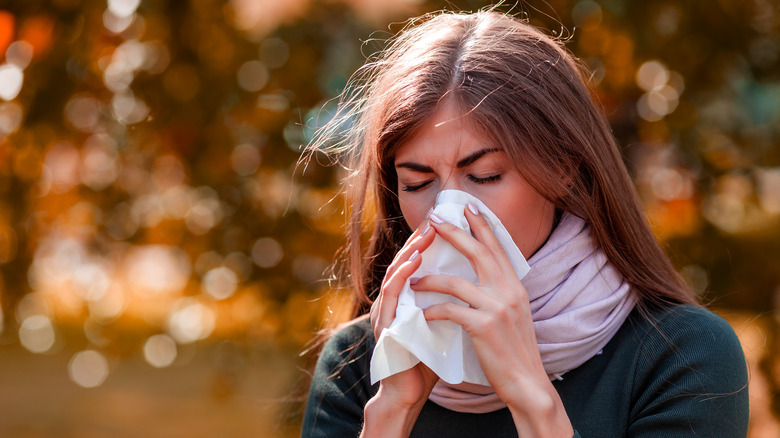This Is What Really Causes Fall Allergies
If you have seasonal allergies in the fall, you may be wondering what's causing them. While there are many different allergens circulating between the months of August and November, the most common culprit of fall allergies is ragweed (via WebMD). Ragweed is a flowering plant that grows virtually everywhere in the United States, especially in more rural areas of the country.
Although they tend to die after the season is over, just one ragweed plant can release more than one billion grains of pollen, which can travel for hundreds of miles at a time, according to the Asthma and Allergy Foundation of America (AAFA). As a result, more than 75% of people with seasonal allergies are allergic or have reactions to ragweed pollen. Mold is another common source of fall allergies. While mold thrives in damp rooms and basements year-round, mold spores can also be found in damp or wet piles of fallen leaves on the ground, which usually occurs in the middle of autumn.
How to treat fall allergies
Regardless of the allergen, however, fall allergies can cause a variety of unpleasant symptoms, including sneezing, runny nose, congestion, itchy and watery eyes, coughing, and headaches (via Prevention). That's why it's important to take the necessary precautions to treat your symptoms and keep them at bay.
For instance, you can actually make your allergy symptoms worse by dragging allergens into your home after spending time outdoors. "Mold spores and pollen can stick to everything, including hair, skin, and clothing," Dr. Rachna Shah, an allergist and faculty member of Loyola School of Medicine, told Prevention. Fortunately, you can help reduce your risk of tracking allergens into your home by leaving your shoes outside, changing and washing your clothes as soon as you walk in the door, and taking a thorough shower.
Although taking these steps can certainly help prevent your allergies from potentially getting worse, they won't do anything to actually treat your symptoms. You can, however, reduce and alleviate your fall allergy symptoms by taking over-the-counter allergy medications, like antihistamines and decongestants. "Many allergy medications are safe and now available over the counter, including nasal steroid sprays like fluticasone and triamcinolone, and the long-acting, non-sedating antihistamines such as loratadine and cetirizine," allergist Dr. Mark Aronica told the Cleveland Clinic. "These medications are generally very good at managing most allergies."


